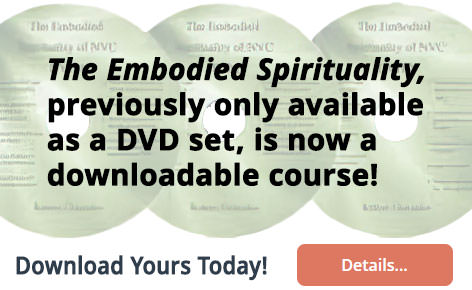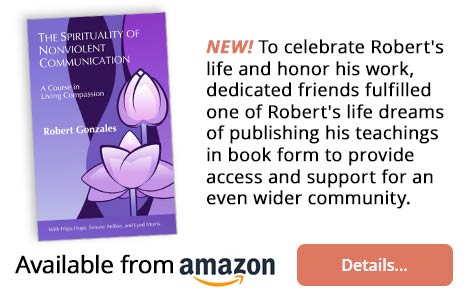

Welcome to the Robert Gonzales Training Legacy. Here you can learn more about Robert and the powerful teachings he dedicated his life to. NVC Academy is proud to house and share with you the complete body of his life's work. We invite you to explore, learn, and help keep his legacy alive!
Robert's passion was in the spirituality of the Nonviolent Communication (NVC) process. He saw NVC both as a process that helps people connect more authentically with themselves and others, and as a spiritual practice and way of living. The worldwide NVC community mourned when Robert died in 2021. He left behind a legacy of work that emerged from a lifetime of inquiry into the intersection between spirituality and human communication. More about Robert.
Article
23 - 34 minutes
The pandemic has unsettled deep patterns of consumption. There’s a fear, and with it comes the mindset that is the heart of rampant consumption; habits which are essential to the market economy’s “economic recovery”. High consumption is also the most direct cause of environmental degradation. What do we need in order to significantly reduce consumption for our greater resilience and freedom, and to increase our planetary and human sustainability?
Details...Article
4 - 6 minutes
When it comes to self-sabotage and self-limitation, what's happening when we make ourselves smaller than we are? And what is it with the crippling experience we suffer when we exceed our own self-imposed limitations? What unconscious needs is your nervous system meeting by remaining small? Read on for the insights of Beatrice Beebe's research on biological imperatives, emotional language, and emotional limitations.
Details...Article
4 - 6 minutes
To express opposition without stimulating distress, stop judging and look for ways to honor, understand, and have compassion for others. You can do this by finding a point of agreement. For example, you can agree with part of what they said. Or if you completely disagree, you can express what greater understanding, inspiration, appreciation or empathy you have in response to what they're saying. Read on for more on this, plus, ten sentence stems to get you started.
Details...Article
16 - 24 minutes
Instead of allocating resources based on needs, we cling to having more money or privilege than others because its close enough substitute for our deeper longing. We may cling to narratives that seem to legitimize this inequality as something we deserved -- such as earning it; having more talent or ability; or needing more for company growth. This soothes our discomfort of having more than others. But these narratives still block us from genuinely getting in touch with the needs of life.
Details...Video
5 minutes
As human beings, our inherent goodness makes most of us believe in equality and yet sometimes our conviction in this same 'goodness' may make us blind to the reality of our own behavior. We are so convinced about the innocence of our intention that we seize to look at the impact of our behavior and thus our unconscious biases often go unexamined and unchallenged. Diversity, equity and inclusion work will only be of lip-service until we are willing to look at our own unconscious biases. Listen as Anisha Pandya encourages you to look at the possibility of how our self-awareness is so limited and one of the ways of expanding that awareness is by moving beyond our intention, looking at the impact of our behavior and remaining open to feedback.
Details...Trainer Tip
2 - 4 minutes
The American mythos of Independence Day is that liberty, equality, and opportunity are for all. Yet since the country's formation, these needs have been for some at the expense of others. It started with the brutal robbery and genocide of Native Americans and slavery of Africans. And this theme continued for generations in various forms, including how we related to other peoples, countries, and the ecosphere. To achieve true justice, liberty, and opportunity for all we may need to overcome the ego's sense of separation. Compassionate noncooperation may also be key.
Details...Practice Exercise
2-3 minutes
Empathy is a form of attunement. Empathy is giving your compassionate curiosity by guessing another’s feelings and needs. Consider how you live or relate to each of these 12 essential aspects of empathy. Some of them mention how we can offer empathy without abandoning ourselves, how empathy isn't always the best response, and how "Empathy can be offered when you disagree with another’s opinion, memory, or perspective."
Details...Practice Exercise
3-5 minutes
"Falling out of love" is a misleading concept that can lead to feelings of helplessness in relationships. The initial intense phase of love gradually gives way to the need for intentional effort and communication. Unrealistic relationship expectations can erode connection, causing the perception of falling out of love. To address this, we can ask key questions and seek clarity to attend to unmet needs and maintain a healthy connection.
Details...Practice Exercise
2-3 minutes
We can use anger as an important signal to let us know that we perceive a threat to a universal need or value, directing our attention to something so that we can take effective action, and avoid harmful thought patterns. For example, instead of dwelling on a "should," focus on addressing unmet needs through boundaries and effective communication.
Details...Audio
17 minutes
The human species is trained and habituated towards separation. This model encourages humans to either give up on their needs or fight for their needs. In this short video, Miki shares how increasing capacity shifts habits of separation and supports holding of all needs. Through intensive lifelong practices we learn to increase our capacity to receive and to increase our capacity to be generous supports our overall capacity to hold all needs.
Details...

